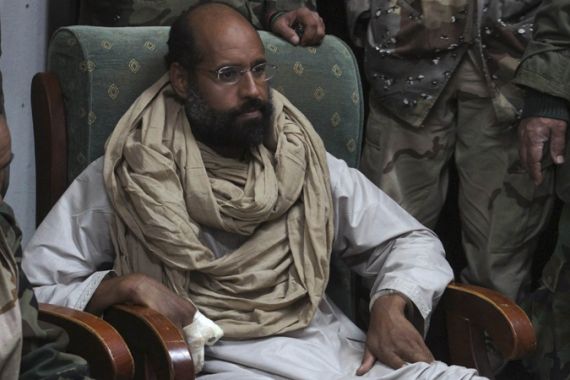Libyan forces take control of Tripoli airport
Zintan militias, providing security for country’s main airport since Gaddafi’s fall, make way for government forces.

The Libyan government has assumed control of the country’s main international airport from fighters who had been providing security for months in the absence of an official force.
The handover marked a step forward for Libya’s new rulers as they try to stamp their authority on the country and bring under their control the various armed brigades that helped topple long-time ruler Muammar Gaddafi.
Fighters from the powerful Zintan militia took control of the airport, the country’s main air hub, eight months ago in the closing days of last year’s civil war.
In recent months, the fighters had demanded that the government shoulder the responsibility of providing security at the airport and relieve them of the duty, or at least give them uniforms and employ them.
The government promised last month to take over security of the airport, but negotiations broke down.
On Friday, uniformed government troops took control of the airport, and the former rebels fired celebratory gunshots into the air to mark the occasion.
Colonel Ibrahim Hadoud, a defense ministry official, said he would be heading a group of soldiers that will provide security for the airport and a 15km radius around it.
“These guys with me are former rebels who have joined the integration programme by the defense ministry and have been trained,” Hadoud said, referring to an effort by the government to encourage former rebels to hand over their weapons in exchange for jobs.
Case against Saif al-Islam
Meanwhile, the government said it was continuing to build its case against Saif al-Islam, Gaddafi’s son, gathering witnesses and documents, as it seeks to persuade the International Criminal Court (ICC) to allow for a local trial.
The ICC issued an arrest warrant for Saif al-Islam last year after prosecutors accused him and others of involvement in the killing of protesters during the revolt that eventually toppled his father, who ruled for 42 years.
The Hague-based court has called on Libya to hand Saif al-Islam over but Tripoli has insisted he will be tried in his home country after his capture in the southern desert in November.
Luis Moreno-Ocampo, the ICC chief prosecutor, travelled to Libya this week as part of ICC investigations into crimes committed during Libya’s war, meeting the head of the ruling National Transitional Council and chief prosecutor.
“I understand he has more than 30 witnesses, he’s got documents, he has interceptions, so I understand he has a strong case but I don’t know the details,” Moreno-Ocampo told a news conference on Saturday, adding he had not seen the information as it remains confidential at this stage of the investigation.
Tripoli is to outline its case to the ICC on April 30 as to why it should put Saif-al Islam on trial. Libya has the right to try him on its soil following his arrest there.
The ICC will only act if a country is deemed unable or unwilling to investigate or prosecute, for instance when its legal system has collapsed.
Moreno-Ocampo said it seemed unlikely any trial would transpire before Libya’s first free elections in June.
“There is no deadline for the judges. I suppose two, three months but in the meantime I don’t see a trial in Libya before that because the process requires first an accusation,” he said.
Several human rights groups have questioned whether the Libyan justice system can meet the standards of international law as the interim national government struggles to impose its authority on a myriad of armed groups.
Tribal clashes
In the southeast of the country, clashes pitting tribesmen against a peacekeeping brigade left two people dead and four others wounded, according to local sources.
“The situation is bad,” Toubu tribe leader Issa Abdelmajid Mansur told AFP news agency in reference to fresh fighting in the desert town of Kufra.
“We are being attacked by the Shield Libya brigade… until now we have two dead and one person wounded,” in our ranks, he said, pinning responsibility for the “siege” on the ruling National Transitional Council.
Wissam Ben Hamid, head of the Shield Libya brigade, said that fighting erupted after Zwai tribesman shot dead a Toubu man.
“The Toubu reacted by firing on every car passing near their neighbourhood,” Hamid told AFP, adding three of his men were wounded.
“We asked them to pull back in vain,” he continued.”Clashes with medium weapons are underway.”
In February, clashes pitting Toubu against Zwai tribesmen in Kufra cost more than 100 lives and displaced half the population, according to UN figures.
Libya’s nascent army intervened by sending a brigade of former rebel fighters to uphold a hard-won ceasefire between the two camps.